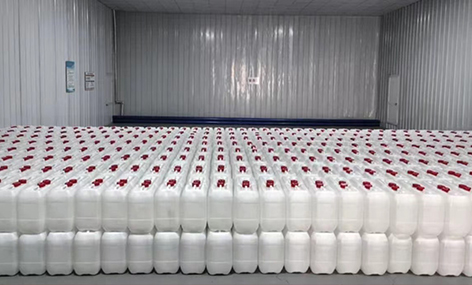
10 月 . 02, 2024 19:58 Back to list
Understanding the Composition and Uses of Glacial Acetic Acid in Various Industries
Understanding Glacial Acetic Acid
Glacial acetic acid is a crucial chemical compound widely used in various industries and laboratories. It is essentially acetic acid in its pure form, characterized by its colorless appearance and pungent odor. With a molecular formula of C₂H₄O₂ and a molecular weight of approximately 60.05 g/mol, glacial acetic acid has unique properties that make it essential in both chemical synthesis and industrial applications.
Definition and Properties
The term glacial refers to the fact that at room temperature, acetic acid can condense into a solid state if cooled, resembling ice. This solid form occurs at temperatures below 16.6 degrees Celsius (approximately 62 degrees Fahrenheit). When heated above this temperature, it returns to a liquid state. Glacial acetic acid is highly concentrated, typically containing over 99% acetic acid with very low water content.
As a polar solvent, glacial acetic acid exhibits a high dielectric constant, which allows it to dissolve a wide range of organic and inorganic substances. It is hygroscopic, meaning it can absorb moisture from the air, and it typically appears as a clear liquid with a boiling point of 118.1 degrees Celsius (244.6 degrees Fahrenheit). The chemical reactivity of glacial acetic acid is notable; it can participate in numerous reactions, including esterification and acylation processes, making it a valuable reagent in organic chemistry.
Industrial Applications
One of the most significant uses of glacial acetic acid is in the production of various chemicals. It is a key raw material in the manufacture of acetates, such as ethyl acetate, butyl acetate, and cellulose acetate. These acetates have applications in the paint, textile, and plastics industries. For instance, ethyl acetate is widely used as a solvent in coatings and adhesives due to its excellent solvent properties and relatively low toxicity.
Moreover, glacial acetic acid serves as a precursor in the synthesis of peracetic acid, which is an important disinfectant and bleaching agent. The food industry also employs acetic acid as a food preservative, contributing to the safety and shelf life of various products.
what is meant by glacial acetic acid

Beyond chemical synthesis, glacial acetic acid has applications in the textile industry, particularly in dyeing processes and as a mordant. It helps enhance the binding of dyes to fabrics, yielding vibrant colors. Furthermore, glacial acetic acid is used in the production of vinegar, which contains approximately 4-8% acetic acid and is a staple in cooking and food preservation.
Laboratory Uses
In laboratories, glacial acetic acid is used as a solvent for recrystallization and chromatography techniques. Its ability to dissolve a wide variety of compounds makes it a versatile tool in organic synthesis and chemical analysis. Researchers often utilize glacial acetic acid as a reagent in experiments to explore various chemical reactions or to modify compounds for further study.
However, it is essential to handle glacial acetic acid with caution due to its corrosive nature. Direct contact with skin or eyes can result in severe irritation or burns, and inhalation of its vapors can lead to respiratory distress. Proper safety measures, including personal protective equipment (PPE), should be implemented when working with this substance.
Environmental Considerations
While glacial acetic acid has various industrial and laboratory applications, it is vital to consider its environmental impact. Like many industrial chemicals, excessive discharge into the environment can lead to pollution and affect aquatic life. Therefore, responsible handling and disposal practices are necessary to mitigate its environmental footprint.
Conclusion
In conclusion, glacial acetic acid is an essential chemical compound with multiple applications across various industries and laboratories. Its unique properties—ranging from its role in chemical synthesis and preservation to its use as a solvent—underscore its importance in modern chemistry and manufacturing. However, caution is necessary to ensure the safety of individuals and the environment when working with this potent substance. Understanding glacial acetic acid and its applications helps to appreciate its role in everyday products and industrial processes.
